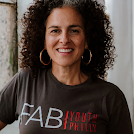 |
| Source: Rebecca Fabiano |
By Guest Blogger Rebecca Fabiano, Founder & President of FAB Youth Philly. (Note: This blog was originally published in Youth Today.)
We did something revolutionary with our two newest job postings in our youth program: offered them as full-time, year-round positions. Typically, these positions are part-time, hourly, temporary positions — and that is simply not working for us, or for our field, any longer.
Like many out-of-school time and afterschool programs, we’ve had to hire program staff at least two, even three times per year. While the function of these positions might be similar or even the same, because the time of day for the programs differs so greatly, we often have to hire different staff.
This creates a cycle of recruiting, interviewing, on-boarding, training, and off-boarding that is counterintuitive and counterproductive to the things we stand for in our field: positive relationships between youth and adults and equitable, career paths that have a living wage. It costs organizations of all sizes, but especially small organizations like ours, significant amounts of time and money, including for job postings, clearances, swag, and staff salaries. It takes up valuable time that could be put towards programming, staff training, community engagement and more, because we are doing it every three, six and nine months to be able to staff our afterschool and summer programs.
This approach to hiring is rooted in the nonprofit industrial complex and concepts like scarcity thinking. It is a waste of time, money and talent and keeps the very people we say add value to our organizations poor and less able to establish a meaningful career in our field. But most of all, for us, at Fab Youth Philly, this hamster wheel of hiring keeps us from building and maintaining trusting, caring and consistent relationships with the teens and their families we work with. If there is a new person from an unknown phone number calling or texting or sending an email every six months, how is a teen supposed to feel connected to us? How do caregivers know who to contact if they have a question or concern?
 |
| Source: Temescal Associates |
“But what will these new hires do all day?” you ask. They will do and get paid for the things we ask them to do for free or outside of their work hours or for the “passion for the work”.
They will be able to attend community meetings and conduct outreach and build relationships. They will have time for planning and curriculum development. They will have time to collaborate with their colleagues — and we are hoping, as we continue to build relationships with schools and other youth-serving, nonprofit organizations and businesses. They can provide additional support in schools or public libraries or offer clubs during the day at school or at childcare centers. We see these full-time positions serving as a bridge between the school day and out-of-school time.
If you or someone you know are interested in this approach, check out the job description and others currently available on our FAB Youth Philly website. And if you’re a youth-serving organization who wants to follow the same path, here are three ways to get started:
1. Talk with your board of directors. Consider whether this move aligns with your organizational values and goals; if not, work with your board on what might need to shift.
2. Review your budget and see where there is room to create full-time positions. We had some under-spending and talked with one of our funders about allocating this funding for the purpose of hiring full-time staff. You may have to plan a year or more out before you can offer a full-time position.
3. Talk with current or potential funders about your hiring goals and see if they are interested in testing this concept with you.
Rebecca Fabiano is the president and founder of Fab Youth Philly. For nearly 25 years, she has worked in various capacities across nonprofit and youth-serving organizations, served on boards and helped to build solid youth programs that engage, encourage, and create spaces for positive development.





No comments:
Post a Comment